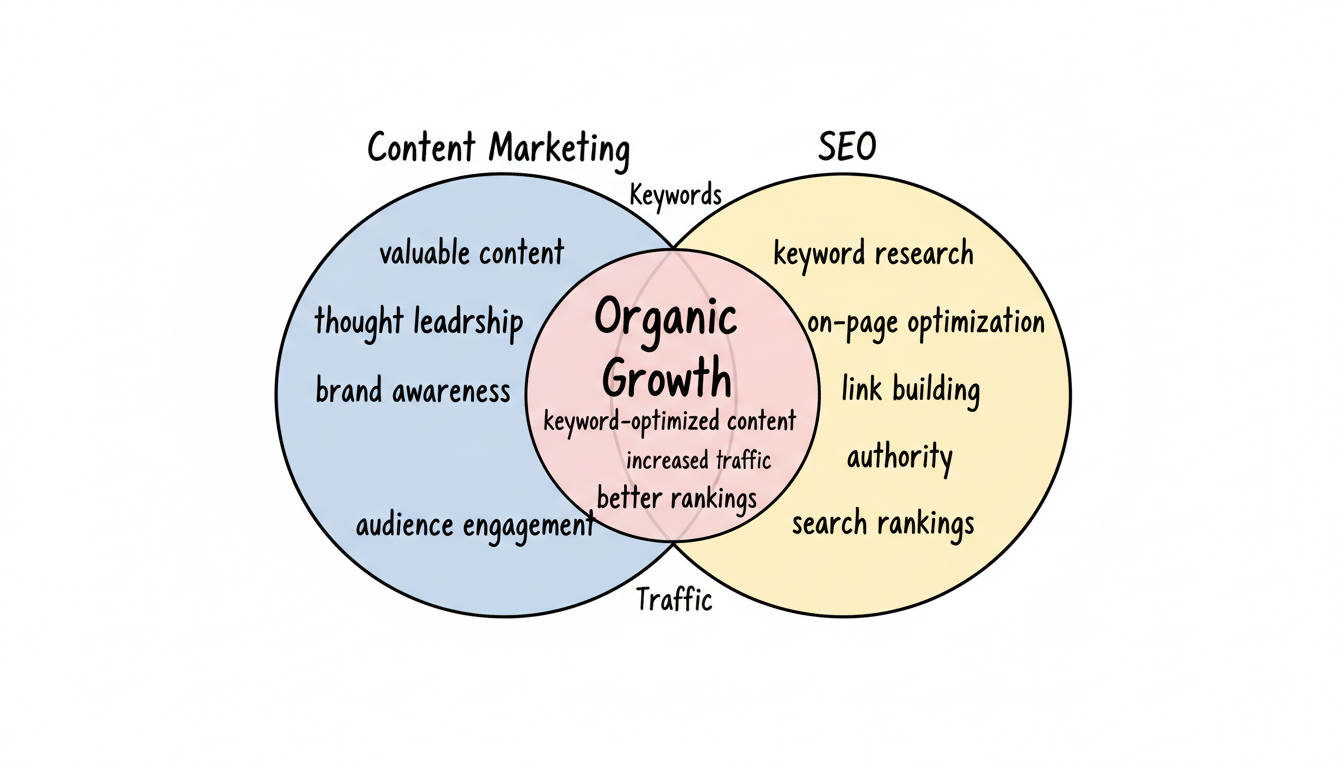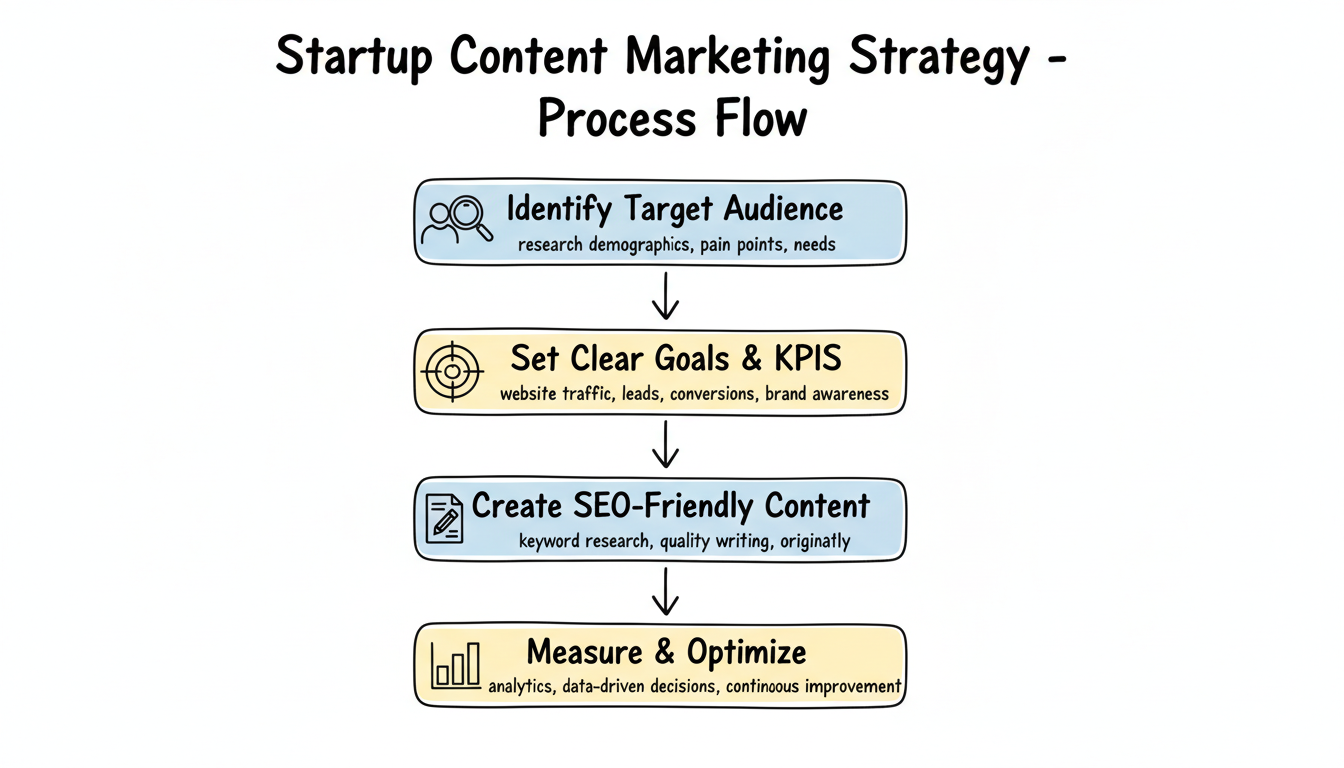In today's digital landscape, content marketing has become an essential strategy for startups looking to establish a strong online presence. Not only does content marketing help businesses connect with their target audience, but it also plays a crucial role in driving organic traffic to their website. By creating SEO-friendly content, startups can optimize their online visibility and improve their chances of success. In this article, we will delve into the basics of content marketing, explore the intersection of content marketing and SEO, discuss how to craft a content marketing strategy, highlight the importance of creating SEO-friendly content, and provide insights on measuring the success of your content marketing efforts.
Before diving deeper into the world of content marketing, it is important to have a clear understanding of what it entails, especially for startups. Content marketing can be defined as the practice of creating and distributing relevant and valuable content to attract, engage, and ultimately convert your target audience. For startups, content marketing serves as a powerful tool for establishing thought leadership, building brand awareness, and nurturing customer relationships.
When implemented correctly, content marketing can significantly impact a startup's growth by driving website traffic, generating leads, and increasing conversions. However, to achieve success in content marketing, startups must recognize that it is a long-term strategy that requires consistent effort and commitment.
Content marketing is not just about creating random pieces of content. It involves a strategic approach that aligns with the startup's goals and target audience. By understanding the needs and pain points of their target audience, startups can create content that resonates with them and provides value. This value can come in the form of educational articles, informative videos, engaging podcasts, or interactive infographics.
For startups, content marketing goes beyond traditional advertising and focuses on providing value to the audience. It involves creating and sharing content that addresses their pain points, offers solutions to their problems, and educates them about your industry. By doing so, startups can position themselves as trusted advisors and establish credibility in their respective fields.
Startups can leverage various content formats to engage their audience and build relationships. Blog posts allow them to share in-depth knowledge, industry insights, and actionable tips. Ebooks and whitepapers provide comprehensive guides and research-backed information. Infographics and videos offer visually appealing and easily digestible content. By diversifying content formats, startups can cater to different learning preferences and capture the attention of a wider audience.
Content marketing plays a pivotal role in the growth of startups. It helps them build brand awareness, attract new customers, and cultivate a loyal customer base. By consistently publishing valuable and informative content, startups can establish themselves as industry leaders and gain the trust of their target audience.
Moreover, content marketing allows startups to showcase their expertise and differentiate themselves from competitors. By sharing unique insights, thought-provoking perspectives, and innovative ideas, startups can position themselves as industry disruptors and attract attention from potential investors, partners, and customers.
In addition to brand building and customer acquisition, content marketing also contributes to search engine optimization (SEO). By creating high-quality content that is optimized for relevant keywords, startups can improve their search engine rankings and increase organic traffic to their website. This, in turn, leads to more visibility, credibility, and opportunities for growth.
Content marketing is an ongoing process that requires continuous monitoring, analysis, and optimization. By evaluating the performance of their content, startups can identify what works and what doesn't, allowing them to refine their strategies and deliver even more valuable content to their audience.
Content marketing and SEO are two practices that go hand in hand. While content marketing focuses on creating valuable content to engage and attract users, SEO ensures that this content is visible and discoverable by search engines.
Content marketing is all about providing valuable and relevant information to your target audience. It involves creating high-quality blog posts, articles, videos, and other forms of content that resonate with your audience and address their pain points. This content is designed to educate, entertain, and inspire, ultimately building trust and loyalty with your audience.
On the other hand, SEO is the process of optimizing your website and its content to improve its visibility in search engine results pages (SERPs). It involves various techniques such as keyword research, on-page optimization, link building, and technical optimization. The goal of SEO is to make your content more accessible to search engines, so they can understand its relevance and rank it higher in search results.
SEO plays a crucial role in content marketing by optimizing content for search engines. By understanding how search engines work and incorporating SEO techniques into your content creation, startups can improve their organic rankings and drive more traffic to their website.
One of the key aspects of SEO in content marketing is keyword research. Startups must conduct thorough keyword research to identify the relevant keywords for their target audience. This involves understanding the search intent behind those keywords and selecting the ones that align with the goals of your content.
Once the keywords are identified, it's important to strategically incorporate them into your content. This helps search engines understand the context and relevance of the content, making it more likely to appear in relevant search results. However, it's crucial to strike a balance and avoid keyword stuffing, as search engines penalize websites that engage in such practices.
Although SEO and content marketing are distinct practices, they work together to achieve common goals. Content marketing provides the substance and value that search engines look for, while SEO ensures that this content is visible and accessible to the target audience.
When you create high-quality content that addresses the needs and interests of your target audience, you naturally attract more organic traffic. This is where SEO comes into play. By optimizing your content for relevant keywords and improving its overall visibility, you can amplify the reach and impact of your content.
Additionally, SEO can help you identify content gaps and opportunities. By analyzing search data and user behavior, you can uncover topics and keywords that are highly searched for but have limited competition. This allows you to create content that fills those gaps and positions your startup as a trusted authority in your industry.
By combining the power of content marketing and SEO, startups can create a holistic digital marketing strategy that drives organic traffic, builds brand visibility, and generates valuable leads. It's important to continuously monitor and analyze the performance of your content and make data-driven optimizations to ensure long-term success.

Building an effective content marketing strategy requires careful planning and consideration. Startups must determine their target audience and set clear marketing goals to guide their content creation efforts. Let's explore the key steps in crafting a content marketing strategy.
Understanding your target audience is essential for creating content that resonates with them. Startups must research and analyze their target market to identify their demographics, interests, pain points, and information needs. This knowledge will help them create content that addresses their audience's specific challenges and provides solutions.
Startups can leverage tools such as market research surveys, social media analytics, and customer feedback to gain insights into their target audience. By understanding their audience, startups can tailor their content to meet their needs and preferences.
Setting clear marketing goals is crucial for measuring the effectiveness and success of your content marketing efforts. Startups should identify what they want to achieve through content marketing, whether it's increasing website traffic, generating leads, improving conversions, or enhancing brand visibility.
Once the goals are defined, startups can create and measure relevant Key Performance Indicators (KPIs) to track their progress. By regularly monitoring and evaluating these KPIs, startups can make data-driven decisions and optimize their content marketing strategy accordingly.

Creating SEO-friendly content is essential for startups to maximize their online visibility and attract organic traffic. Here are some key considerations to keep in mind:
Effective keyword research forms the foundation of SEO-friendly content creation. Startups must identify the keywords that their target audience is searching for and incorporate them naturally into their content. Tools like Google Keyword Planner, SEMrush, and Moz Keyword Explorer can help startups discover relevant keywords and understand their search volume and competitiveness.
However, it's important to note that keyword stuffing should be avoided. Content should be written for humans, not just search engines. By crafting valuable and engaging content that naturally incorporates keywords, startups can optimize their content for both search engines and user experience.
Creating high-quality, original content is another crucial factor in SEO-friendly content creation. Startups should focus on providing valuable information, unique insights, and innovative ideas to their target audience.
Search engines prioritize content that is authoritative, trustworthy, and relevant. By consistently delivering high-quality content, startups can build a strong online presence and establish themselves as industry leaders. Additionally, original content helps prevent duplicate content issues and ensures that your content stands out from competitors.
Measuring the success of your content marketing efforts is essential for understanding the impact of your strategies and making informed decisions. Let's explore some tools and metrics that can help startups track and interpret the success of their content marketing.
Startups can utilize various tools to track the performance of their content marketing efforts. Google Analytics is a popular tool that provides valuable insights into website traffic, user behavior, and conversions. It enables startups to track key metrics such as page views, bounce rate, average session duration, and goal completions.
In addition to Google Analytics, startups can also use social media analytics tools to measure the engagement and reach of their content on different social media platforms. These tools provide data on likes, shares, comments, and follower growth, helping startups assess the impact of their social media content.
Interpreting content marketing metrics allows startups to gain valuable insights into the effectiveness of their strategies. Metrics such as website traffic, conversion rate, and engagement rate provide an overview of how well the content is performing.
Startups should regularly analyze these metrics to identify trends, understand user behavior, and make data-driven decisions. By identifying successful content types, topics, and distribution channels, startups can optimize their content marketing efforts and achieve better results.
In conclusion, creating SEO-friendly content is a vital aspect of content marketing for startups. By understanding the basics of content marketing, recognizing the intersection of content marketing and SEO, crafting a comprehensive content marketing strategy, and creating valuable and optimized content, startups can maximize their online visibility and drive growth. Furthermore, measuring and analyzing the success of content marketing efforts enables startups to refine their strategies, adapt to changing market dynamics, and stay ahead of the competition. Implement these content marketing tips for startups to create SEO-friendly content and unlock the potential of your business in the digital realm.
By submitting this form, you agree to our Privacy Policy and Terms & Conditions.